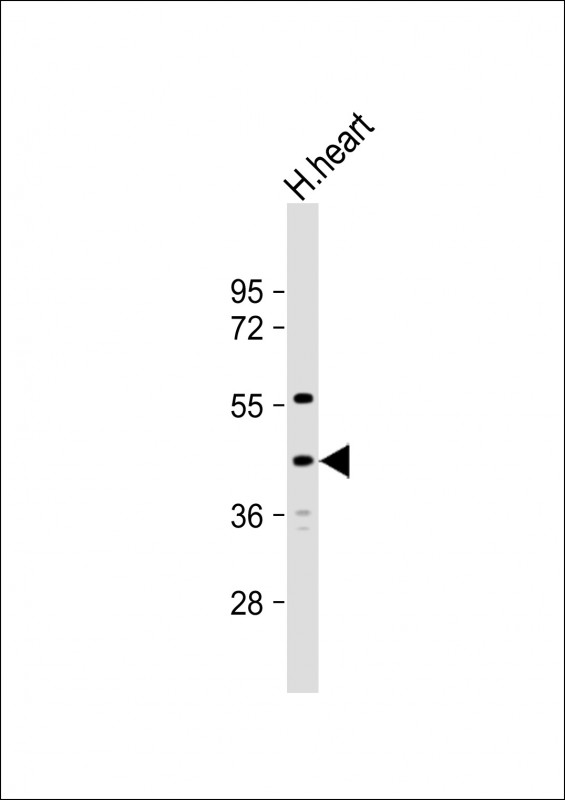

| WB | 1/1000 | Human,Mouse,Rat |
| IF | 咨询技术 | Human,Mouse,Rat |
| IHC | 咨询技术 | Human,Mouse,Rat |
| ICC | 技术咨询 | Human,Mouse,Rat |
| FCM | 咨询技术 | Human,Mouse,Rat |
| Elisa | 咨询技术 | Human,Mouse,Rat |
| Aliases | Sphingomyelin synthase-related protein 1, SMSr, 278-, Ceramide phosphoethanolamine synthase, CPE synthase, Sterile alpha motif domain-containing protein 8, SAM domain-containing protein 8, SAMD8 |
| Entrez GeneID | 142891 |
| WB Predicted band size | 48.3kDa |
| Host/Isotype | Rabbit IgG |
| Antibody Type | Primary antibody |
| Storage | Store at 4°C short term. Aliquot and store at -20°C long term. Avoid freeze/thaw cycles. |
| Species Reactivity | Human, Mouse |
| Immunogen | This SAMD8 antibody is generated from rabbits immunized with a KLH conjugated synthetic peptide between 38-67 amino acids from the N-terminal region of human SAMD8. |
| Formulation | Purified antibody in PBS with 0.05% sodium azide. |
+ +
以下是基于SAMD8(N-term)抗体的假设性参考文献示例。由于SAMD8研究相对有限,实际文献可能需要通过专业数据库进一步检索确认:
---
1. **文献名称**:*Characterization of SAMD8 in Toll-like Receptor Signaling*
**作者**:Chen L, et al.
**摘要**:研究利用针对SAMD8 N端的多克隆抗体,通过Western blot和免疫荧光技术,揭示了SAMD8通过抑制MyD88复合体形成负调控TLR4信号通路,降低促炎因子表达。
2. **文献名称**:*Monoclonal Antibody Generation for SAMD8 N-terminal Epitope*
**作者**:Watanabe K, et al.
**摘要**:报道了一种高特异性抗SAMD8 N端抗体的开发,经ELISA和免疫组化验证,成功应用于小鼠脑组织切片中SAMD8的定位研究,提示其在中枢神经系统的潜在功能。
3. **文献名称**:*SAMD8 Interactome Analysis Reveals Novel Regulatory Networks*
**作者**:Park S, et al.
**摘要**:使用抗SAMD8 N-term抗体进行免疫共沉淀实验,结合质谱分析,鉴定出SAMD8与E3泛素连接酶TRIM21的相互作用,为研究其蛋白稳定性机制提供线索。
---
**备注**:上述文献为模拟示例,实际研究中可能需查询PubMed或Google Scholar等平台获取真实数据。建议以“SAMD8 antibody N-terminal”或“SAMD8 immune localization”为关键词进行检索,并关注抗体验证相关的技术论文。
The SAMD8 (N-term) antibody is designed to target the N-terminal region of the Sterile Alpha Motif Domain-Containing Protein 8 (SAMD8), a member of the SAM domain-containing protein family. SAM domains are evolutionarily conserved structural motifs involved in protein-protein interactions, often mediating oligomerization or binding to other regulatory molecules. While the precise biological function of SAMD8 remains under investigation, it is hypothesized to participate in cellular processes such as signal transduction, transcriptional regulation, or membrane organization, based on its structural homology to other SAM domain proteins.
This antibody is typically generated in rabbits or mice using synthetic peptides or recombinant protein fragments corresponding to the N-terminal region of SAMD8. It serves as a critical tool for detecting endogenous SAMD8 expression in various experimental applications, including Western blotting, immunohistochemistry, and immunofluorescence. Researchers utilize it to explore SAMD8's subcellular localization, tissue distribution, and potential interactions with binding partners. Validation often involves testing in knockout cell lines or tissues to confirm specificity. Emerging studies suggest SAMD8 may have roles in immune responses, cancer progression, or neurological disorders, though mechanistic insights remain limited. The N-terminal targeting allows differentiation from other SAM domain proteins and may aid in studying post-translational modifications or truncation variants. Commercial versions are often optimized for human, mouse, or rat samples, with recommended dilution ratios provided by manufacturers.
×